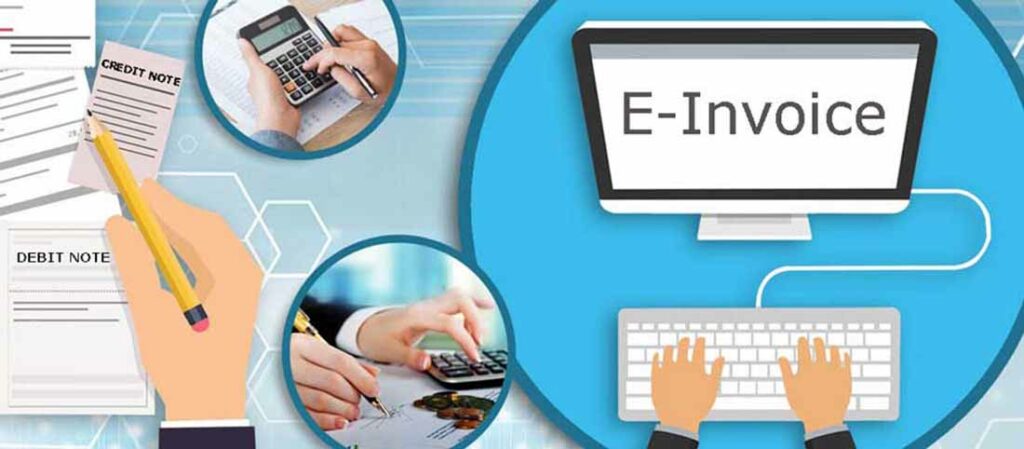CaptainBiz Launches Unlimited e-Invoices and e-Way Bills on Mobile App

Enhanced Operational Efficiency for MSMEs: CaptainBiz’s unified and streamlined approach to managing e-invoices and e-way bills integrates seamlessly into business workflows, ensuring accuracy and compliance while optimizing operational processes.
[Ahmedabad, 09/07/2024] – CaptainBiz, a leading Fintech-SaaS platform empowering the seamless and efficient management of business for MSMEs, proudly announces the launch of its comprehensive suite for generating e-Invoices and e-Way Bills on its Android mobile app and web browser with iOS launching soon. Optimized invoicing and shipping processes will allow MSMEs to run their operations more smoothly, claim Input Tax Credit, and comply with regulations.
With CaptainBiz’s intuitive interface and smart automation, businesses can now seamlessly onboard themselves with a single registration for both e-Invoice and e-Way Bill generation on the CaptainBiz mobile app or web browser, get automatic data validation and generate unlimited e-Invoices and e-Way bills without the need for additional navigation to the GST portal. This streamlined process significantly reduces errors, enhancing overall efficiency and productivity for MSMEs.
Upon creating an e-Invoice, businesses can generate an e-Way bill with a simple step of updating transport details. Following the recent government mandate to link both critical documents, the e-Way bill is automatically linked with the e-Invoice ensuring full compliance.
CaptainBiz also offers free storage of e-Invoices, ensuring they remain securely accessible beyond the GST portal’s 24-hour deletion period. This added convenience allows businesses to easily retrieve and manage their e-Invoices without worrying about data loss or accessibility issues.
Additionally, with CaptainBiz, MSME’s now also have the power to conveniently cancel e-Invoices or issue e-credit notes and e-debit notes directly within the platform, eliminating the need to visit the GST website for any basic invoice management tasks. This comprehensive suite of e-invoicing and e-way bill features, seamlessly integrated into a single-screen on CaptainBiz empowers MSMEs, making their operations more efficient and manageable.
“E-invoicing is more than a technological shift; it’s a pivotal evolution reshaping India’s business landscape. By streamlining processes, enhancing compliance, and fostering transparency, it empowers MSMEs to thrive in a digital economy and CaptainBiz intends to be at the forefront of this evolution.” said Yashraj Vakil, CEO of CaptainBiz. “Our seamless integration with e-invoicing systems to simplify operations and support MSMEs in navigating regulatory complexities enhances efficiency, promotes financial health, and drives innovative growth models, reinforcing India’s commitment to digital progress.” he added further.
The e-Way bill system was introduced in 2018 for the movement of goods with consignment values exceeding Rs. 50,000. Meanwhile, e-Invoicing was launched in 2020, making it mandatory for businesses with a turnover of Rs. 500 crores. Since then, the government has gradually reduced the threshold based on company turnovers, bringing more businesses under the e-Invoicing system. Currently, businesses with a turnover of Rs 5 crore and above are required to generate e-invoices for their Business to Business (B2B) sales and purchases.
Some reports suggest that the Indian government is considering reducing the turnover threshold to include most MSMEs in the e-invoicing regime. Additionally, the government may mandate e-invoicing for B2C transactions within the next 2-3 years. This is part of the government’s significant push to digitise MSMEs, a move that CaptainBiz fully supports and is committed to helping our subscribers navigate. Lowering the e-invoicing threshold will benefit the business ecosystem by reducing costs, minimizing errors, and processing invoices faster.
Also, starting from 1st March 2024, the government has mandated e-Invoicing for generating e-Way bills to avoid mismatches. This requirement applies to all e-Invoice-enabled taxpayers and transactions related to supplies under B2B and Exports.




